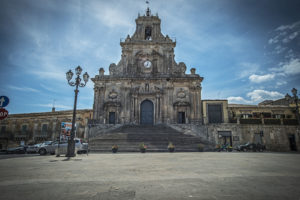The church of
San Sebastiano
(St. Sebastian) is located in the centre of Palazzolo Acreide, a few metres from the town hall in Piazza del Popolo.

Over the centuries the church was rebuilt and modernised several times. The first religious building dedicated to St. Sebastian probably dates back to the 15th century and was built where the church of San Rocco (St. Roch) used to stand.
Very quickly the church proved to be too small and so it was extended; in 1655 the new structure was finished.
But the joy of having a new church did not last long, as the violent earthquake of 1693 almost completely destroyed the church. For many years religious services were held in a hut, a makeshift structure not far from the remains of the church.
Years passed and those in charge of the religious congregation felt the need to rebuild and give the district back its church. The stages of construction were long and complex due to economic difficulties and various debates, especially with the nearby Capuchin friars.
The end result was an incredible sight; it was difficult not to be enchanted by it.
Whether in broad daylight, by the light of sunset, the darkness of the evening, or Christmas lights, the church attracts attention and arouses a strong feeling of majesty and grandeur.